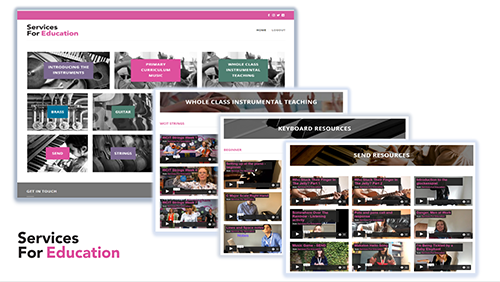Services For Education
Transferred music tuition online during the pandemic
The pandemic posed massive challenges for all charities, but when your entire service model depended on in-person tutoring and engagement, it really was an existential moment. For Services For Education, which provides music tutelage to 38,000 children in Birmingham each week, as well as running ensembles, concerts and community choirs, the first lockdown saw all its delivery channels shut off.
 Music can have a profound impact on mental health and emotional wellbeing, and the trustees at the charity strongly believed that stopping its services would be a dereliction of duty that could have devastating effects on the lives of young people in the Midlands. In short, they felt that the show must go on.
Music can have a profound impact on mental health and emotional wellbeing, and the trustees at the charity strongly believed that stopping its services would be a dereliction of duty that could have devastating effects on the lives of young people in the Midlands. In short, they felt that the show must go on.
This involved a colossal effort by the charity’s teaching and technical staff to shift services to the digital realm. In the first 10 weeks of lockdown, Service For Education completed 540 hours of recording sessions, involving 197 music teachers and 144 hours of editing, with some 800 video tutorials and 380 hours of tuition made available online.
Individual virtual lessons replaced face-to-face activities to support learning for children and parents, and by the third lockdown, the charity was hosting 30,000 online music lessons, with more than 15,000 children participating in online whole-class instrumental teaching. Concerts also were conducted virtually involving over 2,000 young people performing 96 pieces with more than 10,000 views online.
The pandemic provided the charity with the impetus to accelerate a three-year plan to develop the country’s largest online music education resource to support schools and pupils during and post-lockdown. And by utilising its staff instead of furloughing them, Services For Education was able to continue the delivery of services and create a virtual resource with a global reach that is both sustainable and scalable.
Charity Awards judge Sarah Ellis said Services For Education had successfully pivoted its business model in response to the pandemic in a way that maintained its artistic values and principles, and which could be modelled by many organisations in the sector.
“Don’t underestimate the challenge of the pivot for organisations that have never had to use those tools before with those stakeholders,” she said. “I’ve seen a lot of these projects being tokenistic…. but I believe there is a permanency around this project.”
Awards judge Sharika Sharma added that the charity’s work demonstrated strong impact.
CC Reg no. 1148848

